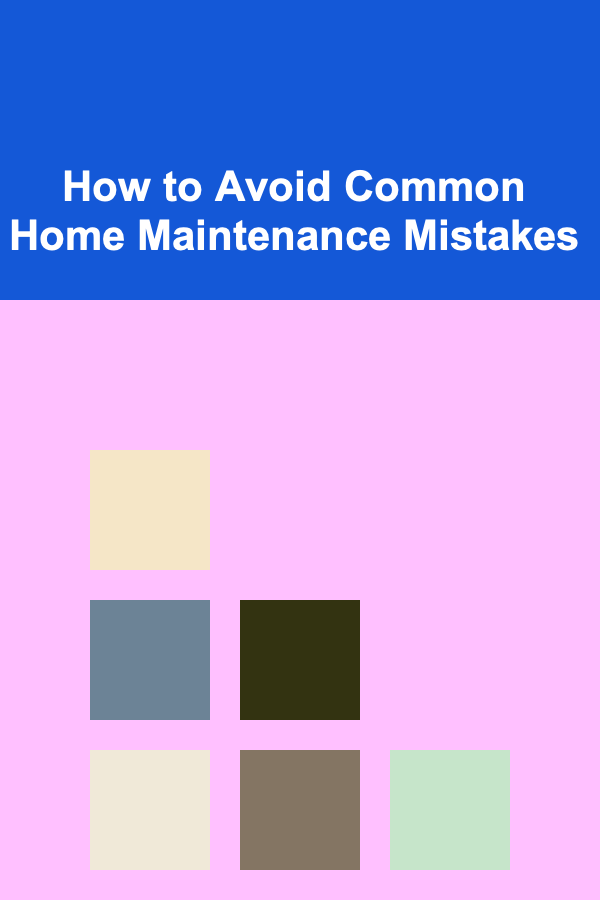
How to Avoid Common Home Maintenance Mistakes
ebook include PDF & Audio bundle (Micro Guide)
$12.99$8.99
Limited Time Offer! Order within the next:

Owning a home is a significant responsibility, and part of that responsibility includes maintaining it. Proper home maintenance ensures your property remains safe, functional, and aesthetically pleasing. However, even experienced homeowners sometimes make maintenance mistakes that can lead to costly repairs, inefficiency, or unnecessary stress. Avoiding these common errors can save you time, money, and effort in the long run.
In this article, we'll dive into some of the most common home maintenance mistakes people make and how to avoid them. By understanding these pitfalls, you can keep your home in top condition and avoid unnecessary headaches.
Neglecting Regular Inspections
Why It's a Mistake
One of the biggest mistakes homeowners make is failing to perform regular inspections. This includes inspecting key components of the home like the roof, plumbing, HVAC system, and electrical wiring. When these systems are ignored or go unchecked for long periods, small issues can snowball into costly repairs or even hazardous situations.
How to Avoid It
Set a schedule for routine home inspections to catch minor problems before they turn into major ones. For example:
- Roof: Check for missing shingles, leaks, or damaged flashing at least once a year.
- Plumbing: Look for signs of leaks, water stains, or corrosion around pipes.
- HVAC: Change filters regularly and have the system serviced annually.
- Electrical: Test outlets, check for exposed wires, and make sure circuit breakers are functioning properly.
If you're unsure about what to inspect or how, consult a professional home inspector who can guide you in evaluating these crucial areas.
Using Cheap Materials for Repairs
Why It's a Mistake
When it comes to home repairs, cutting corners with cheap materials might seem like a good way to save money upfront. However, this often leads to bigger problems down the road. For instance, cheap paint may fade quickly, low-quality plumbing parts may break, and inferior roofing materials might not last as long as more durable options.
How to Avoid It
While it's tempting to go for the least expensive option, investing in higher-quality materials can save you money in the long run. Look for long-lasting, durable products for repairs, even if they come with a higher initial cost. Over time, better materials will require fewer repairs and replacements, ultimately saving you money.
Before purchasing materials, research the options and check reviews. Consult with professionals for recommendations on quality products for each specific repair.
Overlooking Seasonal Maintenance
Why It's a Mistake
Many homeowners fail to properly maintain their homes according to the changing seasons. Neglecting tasks that should be done before or after specific seasons can result in damage and inefficiency. For example, not cleaning gutters in the fall can lead to clogs and water damage, while not winterizing your HVAC system can leave you with a breakdown during the coldest months.
How to Avoid It
Create a seasonal maintenance checklist for your home. Each season brings unique maintenance tasks that should be done to ensure the systems in your home are functioning at their best. For example:
- Spring: Clean windows, inspect the roof, and service the air conditioning system.
- Summer: Maintain the lawn and garden, clean outdoor furniture, and inspect plumbing for leaks.
- Fall: Clean gutters, inspect the chimney, and prepare heating systems for winter.
- Winter: Insulate pipes, check the furnace, and ensure there are no drafts around windows and doors.
Scheduling these tasks in advance and setting reminders will help you stay on top of them.
Ignoring Proper Ventilation
Why It's a Mistake
Proper ventilation is crucial in every home. Insufficient ventilation can lead to mold growth, poor indoor air quality, and even structural damage. Homeowners often ignore areas like attics, basements, and bathrooms, which can accumulate moisture and poor airflow.
How to Avoid It
Ensure that your home has proper ventilation in key areas, such as:
- Attics: Install soffit vents and ridge vents to promote airflow and prevent moisture buildup.
- Bathrooms: Use exhaust fans to eliminate moisture and prevent mold growth.
- Kitchens: Make sure your range hood is venting outside and not just recirculating air inside.
Regularly inspect ventilation systems and replace any fans or vents that are no longer working efficiently. In addition, consider using dehumidifiers in areas that are prone to excess moisture.
Waiting Too Long to Address Leaks
Why It's a Mistake
Leaks, whether from plumbing, the roof, or appliances, are often overlooked or addressed too late. Small leaks can turn into major water damage, mold issues, or even structural damage if not attended to promptly. Many homeowners mistakenly think they can wait until a leak becomes more severe before taking action.
How to Avoid It
As soon as you notice a leak, address it immediately. Whether it's a minor drip from a faucet or a larger issue like a leaky roof, it's always best to act early. Small leaks can be easily fixed with minimal cost, but if left unaddressed, they can lead to significant damage and much higher repair costs.
Keep an eye on places where leaks are more likely to occur, such as:
- Pipes: Inspect pipes under sinks and in the basement for signs of leaks.
- Roof: Check for missing shingles or water stains on the ceiling.
- Appliances: Look for pooling water around dishwashers, refrigerators, or washing machines.
If you can't locate the source of the leak, don't hesitate to call a professional plumber or contractor to investigate.
Overloading Electrical Circuits
Why It's a Mistake
Electrical problems are not only inconvenient---they can be dangerous. Overloading electrical circuits is a common mistake that can lead to blown fuses, damaged appliances, or even electrical fires. Many people unknowingly overload circuits by plugging too many devices into one outlet or power strip.
How to Avoid It
Avoid overloading your home's electrical system by being mindful of the number of devices you plug into a single outlet. Use power strips with built-in surge protectors for added safety, but never daisy-chain multiple power strips together.
Additionally, if you frequently trip circuit breakers or notice sparks when plugging something in, it could be a sign that your system is overloaded or outdated. In such cases, it's crucial to consult an electrician for an inspection and possible upgrade of your system.
Forgetting to Maintain Appliances
Why It's a Mistake
Appliances like your refrigerator, dishwasher, oven, and washer/dryer are vital to the smooth operation of your home. However, many homeowners neglect the maintenance of these appliances, leading to malfunctions, higher energy consumption, and the eventual need for expensive replacements.
How to Avoid It
Perform regular maintenance on your appliances according to the manufacturer's recommendations. This includes:
- Refrigerators: Clean condenser coils every six months to improve efficiency.
- Dishwashers: Clean the filter and check for blockages in the spray arms.
- Dryers: Clean the lint trap after every use and check the vent hose regularly for clogs.
- Washing Machines: Run a cleaning cycle every few months and check for hose leaks.
By taking simple steps to maintain your appliances, you can extend their lifespan and prevent unexpected breakdowns.
Not Understanding Your Home's Systems
Why It's a Mistake
Many homeowners don't fully understand the systems that keep their homes running, such as plumbing, electrical, or HVAC systems. This lack of understanding can lead to improper maintenance and even cause accidental damage during repairs.
How to Avoid It
Take time to familiarize yourself with the basics of your home's systems. Learn where the main water shutoff valve, electrical panel, and HVAC unit are located. Understanding how these systems work will help you address issues quickly when they arise and avoid making mistakes during DIY repairs.
If you're unsure about how something works or need advice on maintenance, don't hesitate to consult professionals. Knowing when to call in an expert can save you from costly mistakes.
Skipping Preventive Maintenance
Why It's a Mistake
Preventive maintenance involves taking proactive steps to avoid problems before they occur. Many homeowners make the mistake of waiting for something to break down before addressing it. However, skipping preventive maintenance can lead to larger, more expensive repairs in the future.
How to Avoid It
Incorporate preventive maintenance into your routine to keep everything in good working condition. This includes things like:
- Cleaning gutters to prevent water damage.
- Checking the caulking around windows and doors to prevent drafts.
- Servicing your HVAC system before the start of the heating or cooling season.
By making preventive maintenance a regular habit, you can avoid costly surprises and extend the life of your home's systems.
Failing to Hire Professionals When Needed
Why It's a Mistake
While DIY projects are often satisfying and cost-effective, some home maintenance tasks are too complicated or risky to tackle on your own. Failing to hire professionals when needed can lead to improper repairs, safety hazards, or even further damage to your home.
How to Avoid It
Know your limits when it comes to DIY maintenance. Some jobs---such as electrical work, major plumbing issues, or roof repairs---should always be handled by licensed professionals. Not only do professionals have the necessary expertise, but they also have access to the right tools and materials to complete the job safely and efficiently.
Hiring the right experts will save you time, effort, and money in the long run, as well as give you peace of mind knowing the job is done correctly.
Conclusion
Home maintenance is a crucial part of homeownership, and avoiding common mistakes can save you a lot of stress, time, and money. By staying on top of inspections, using quality materials, performing regular maintenance, and knowing when to hire a professional, you can keep your home in top condition and avoid costly mistakes. Take a proactive approach to home care, and your home will continue to be a safe, comfortable, and valuable place for years to come.
Reading More From Our Other Websites
- [Organization Tip 101] Best Budget-Friendly Cordless Drills for Home Improvement
- [Home Security 101] How to Integrate Home Automation for Security: Key Features You Should Use
- [Home Budget Decorating 101] How to Create a Functional Space with Budget-Friendly Interior Design
- [Home Budget 101] How to Budget for Seasonal Home Maintenance
- [Scrapbooking Tip 101] Seasonal Scrapbooking: Designing Holiday-Ready Memory Books
- [Personal Investment 101] How to Monetize Deep Learning Models in the E-commerce Space
- [Personal Finance Management 101] How to Protect Your Finances During Economic Uncertainty
- [Home Maintenance 101] How to Choose and Perform Proper Air Filter Replacement for a Healthier Home
- [Home Budget 101] How to Maximize Your Home's Energy Efficiency on a Budget
- [Biking 101] Top 5 Bike Accessories for Phone: Stay Connected on the Go

How to Build a Checklist for Market Segmentation Analysis
Read More
How to Make Money Online as a Clinical Research Coordinator: 10 Actionable Ideas
Read More
How to Offer Tour Guide Services and Make Money While Traveling
Read More
How To Explore the Truth Behind Crop Circles
Read More
How to Build a Natural Shelter for Emergency Camping
Read More
How to Read a Celtic Cross Throw with Playing Cards
Read MoreOther Products

How to Build a Checklist for Market Segmentation Analysis
Read More
How to Make Money Online as a Clinical Research Coordinator: 10 Actionable Ideas
Read More
How to Offer Tour Guide Services and Make Money While Traveling
Read More
How To Explore the Truth Behind Crop Circles
Read More
How to Build a Natural Shelter for Emergency Camping
Read More